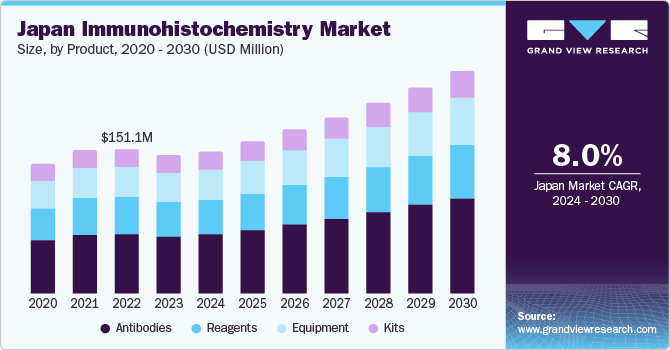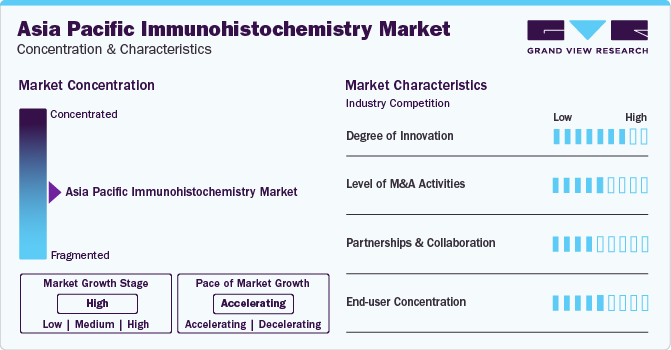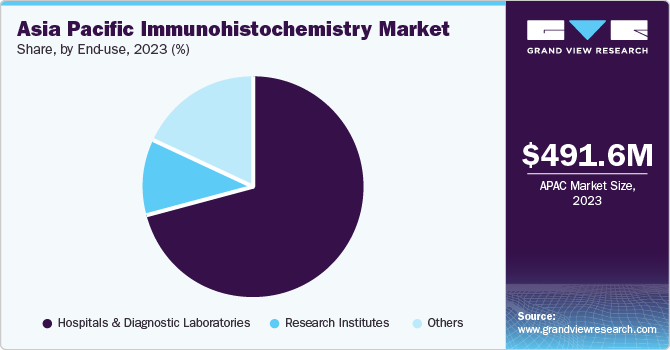- Home
- »
- Clinical Diagnostics
- »
-
Asia Pacific Immunohistochemistry Market Size Report, 2030GVR Report cover
![Asia Pacific Immunohistochemistry Market Size, Share & Trends Report]()
Asia Pacific Immunohistochemistry Market Size, Share & Trends Analysis Report By Product (Antibodies, Reagents, Equipment, Kits), By Application (Diagnostics, Research), By End-use, By Country, And Segment Forecasts, 2024 - 2030
- Report ID: GVR-4-68040-180-6
- Number of Report Pages: 125
- Format: PDF, Horizon Databook
- Historical Range: 2018 - 2022
- Forecast Period: 2024 - 2030
- Industry: Healthcare
Market Size & Trends
The Asia Pacific immunohistochemistry market size was estimated at USD 491.60 million in 2023 and is projected to grow at a compound annual growth rate (CAGR) of 8.8% from 2024 to 2030. Increase in the prevalence of chronic conditions, such as cancer, certain infectious diseases, autoimmune diseases, cardiovascular diseases, nephrological diseases, and diabetes mellitus has led to a wider use of Immunohistochemistry (IHC) techniques in diagnostics. The incidence of cancer is rising steadily, which is expected to boost demand for effective diagnostic methods, including immunohistochemistry. This technique is significant in the determination of oncogenesis & diagnosis of cancer, such as malignant or benign, and their different stages. It facilitates the use of polyclonal and monoclonal antibodies to detect specific antigens in tissues by determining the presence of tumor antigens.

Rise in healthcare spending across the globe is driving demand for the implementation of immunohistochemistry techniques in healthcare sector. According to estimates published by WHO in 2020, global spending on healthcare witnessed a significant increase, accounting for 11% of global GDP or USD 9 trillion. Moreover, developing countries in Asia such as India, Indonesia, Vietnam, and Philippines are increasing their healthcare expenditure to improve overall health services. The healthcare industry is evolving from a fee-for-service model to a value-based model, wherein treatment outcomes are reimbursed. The pressure of reducing healthcare costs is rising globally as the cost of healthcare is increasing faster than the growth of economies.
Various advanced techniques, such as multiplex IHC, computational pathology, and next-generation IHC, have revolutionized the field of conventional IHC. Multiplex IHC can multiply the amount of data derived from a single or limited tissue sample, thus benefitting cellular interactions. For instance, MultiOmyx by NeoGenomics is a multiplexing technique that aids in the analysis of proteins and biomarkers in a single tumor section. In addition, in September 2023, Cell Signaling Technology (CST) introduced SingalStar Multiplex IHC technology for high-throughput IHC assays.
Moreover, key players in the market are introducing novel IHC reagents and antibodies for pharma and biotech industries. For instance, in March 2023, Aptamer Group plc launched Optimer-Fc as a new reagent for automated IHC workflows. In addition, Biocare Medical, LLC in collaboration with Bethyl Laboratories introduced a TIGIT IVD rabbit monoclonal antibody for IHC applications. Such initiatives are driving the immunohistochemistry market growth.
Market Concentration & Characteristics
Market growth stage is high, and pace of market growth is accelerating. The Asia Pacific market is characterized by a high degree of innovation owing to the rapid technological advancements and automation in immunohistochemistry technologies. IHC is a cost-effective and relatively simple technique for investigation of tissue micro-architecture and molecular morphology of cells. It can aid in understanding tissue micro-environment by analyzing morphology, localization of various molecules, and patterns of protein expression.
Recently, immunohistochemistry has been extensively used in oncology research to probe cancer proteome. For instance, in December 2021, BioGenex introduced three novel primary IHC antibodies including CD8A, CD56, and CD163 for cancer diagnosis.
Asia Pacific immunohistochemistry players in the market leverage these strategies to increase their product capabilities and promote the reach of their offerings in the Asia Pacific region. For instance, in January 2023, Agilent Technologies, Inc. and Akoya Biosciences, Inc. entered into a partnership agreement to commercialize workflow solutions for multiplex assays and develop multiplex IHC diagnostic solutions for tissue analysis in the clinical research market.

There are a high number of direct product substitutes for immunohistochemistry. Presence of various traditional staining methods, flow cytometry, in situ hybridization, and fluorescence detection is expected to adversely impact the Asia Pacific market. However, rapid technological advancements in immunohistochemistry are expected to replace conventional tools, thereby lowering the threat to some extent.
End-user concentration is a significant factor in the Asia Pacific market. Since there are a number of hospitals that are driving demand for immunohistochemistry products. In addition, increasing research activities in academic & research institutes is also a key factor likely to create opportunities for immunohistochemistry market in Asia Pacific during forecast period.
Product Insights
Antibodies led the Asia Pacific market and accounted for 41.5% of the market in 2023 and is expected to grow at the fastest CAGR over the forecast period. This high percentage can be attributed to their significant use in disease diagnosis and drug testing. Antibodies are further segmented into primary and secondary antibodies. These form a vital base in various applications such as pathology, neuropathology, and hematopathology. As immunohistochemistry involves antibody-antigen reactions to detect diseases, it is preferred over other conventional forms of staining procedures, thereby aiding in Asia Pacific market growth.
Antibodies are typically used to detect diseases by identification of tumor-specific antigens, tumor suppressor genes, enzymes, tumor cell proliferation markers, and oncogenes. A large number of primary and secondary antibodies are available in market, which aid in drug development, disease diagnosis, and life sciences research.
Reagents held the second-largest market share in the IHC market during the study period owing to their frequent usage in various procedures. These are essentially used to deliver consistent staining and accurate results in the least amount of time. Most reagents supplied by manufacturers are validated and optimized through consideration of their usage in a particular IHC procedure. Reagents include blocking sera & reagents, fixation reagents, chromogenic substrates, stabilizers, organic solvents, diluents, and proteolytic enzymes. A wide range of reagents are available in the market, customized for each step involved in IHC.
Application Insights
Diagnostics segment accounted for the largest market revenue share in 2023. Immunohistochemistry is widely used for diagnosis of chronic conditions, such as cancer, cardiovascular diseases, infectious diseases, autoimmune diseases, diabetes mellitus, and nephrological diseases. It plays a significant role in cancer diagnosis as it detects specific tumor antigens in certain cancers. During breast cancer diagnosis, IHC staining is used on fresh or frozen tissue, which is removed during biopsy. It helps in identifying HER2 or hormone receptor proteins on surface of cancer cells. Thus, prominent applications of immunohistochemistry in diagnostics are driving segment growth.
Research segment is expected to register the fastest CAGR during the forecast period. Researchers in academia, pharmaceutical companies, and healthcare institutions depend on IHC to advance knowledge in various fields such as oncology, neurology, immunology, and pathology. Governments and academic institutions are investing heavily in medical research, which is supporting the segment growth.
Furthermore, the introduction of new products can strengthen the competitive landscape in Asia Pacific market. This can lead to innovation and improved quality. For instance, in March 2021, QIAGEN introduced QIAcube Connect MDx. This platform is used in diagnostic labs for automated sample processing. It is also compatible with a wide range of QIAGEN kits.
End-use Insights
Hospitals segment accounted for the largest share of the Asia Pacific market in 2023. With constant changes in healthcare industry, need for hospitals with advanced facilities has increased. Moreover, the rise in the number of hospitalizations has led to high growth of segment in the Asia Pacific market. With growing prevalence of chronic diseases, such as cancer, infectious diseases, and autoimmune diseases, there is a surge in demand for hospitals & diagnostic centers for the detection of antigens for cancer diagnosis.
Immunohistochemical staining is largely used to identify abnormal cells found in cancerous growth. This has further increased the need for diagnostic centers with advanced instruments to perform such tests. Rise in number of cancer cases is a significant factor driving growth of this segment.

Research institutes sector is projected to witness the fastest CAGR over the forecast period owing widespread use of immunohistochemistry techniques in drug testing. Research institutes engage in collaborations and consortia to pool resources, expertise, and data. These collaborations drive adoption of immunohistochemistry techniques for large-scale studies and clinical trials, contributing to Asia Pacific market growth. For instance, in June 2023, Lunaphore Technologies SA and Cell Signaling Technology, Inc. announced a collaboration to provide researchers with a powerful toolset for conducting comprehensive spatial biology studies, enabling them to gain deeper insights into complex interactions between cells and their environment in various disease states.
Country Insights
Japan dominated the market and accounted for 29.32% share in 2023owing to high government spending to reduce disease burden. Rapidly aging population, increasing expectations for improved quality of life, and government initiatives are propelling immunohistochemistry market. Japan, in contrast to other Asia Pacific countries, offers country-wide cancer screening programs to combat the growing prevalence of cancer. This program offers cancer screening to over 94% of the population in country, thereby driving regional growth. Moreover, several organic and inorganic initiatives undertaken by leading participants to strengthen their presence are driving the market. For instance, in February 2021, SCREEN Holdings Co., Ltd. announced a joint initiative with Kyoto Prefectural University of Medicine (KPUM) with an aim to accelerate precision medicine by combining multiplex immunohistochemistry with AI image analysis technologies.
China is anticipated to witness significant growth in the Asia Pacific market. Some key factors responsible for lucrative market growth in China are the rapidly aging population, a growing number of laboratories, and improving medical infrastructure. According to NCBI, one in ten individuals living in China meets the criteria for obesity. The high prevalence of obesity has led to a rise in the prevalence of chronic conditions, such as stroke, diabetes, and atrial fibrillation. The increasing prevalence of chronic diseases and the presence of a high target population, along with high unmet clinical needs, are expected to support immunohistochemistry market growth.
Key Companies & Market Share Insights
Some of the key players operating in the Asia Pacific immunohistochemistry market include Thermo Fisher Scientific Inc., F. Hoffmann-La Roche Ltd., Merck KGaA, and Danaher Corporation.
-
Thermo Fisher Scientific, Inc. is a developer and supplier of analytical equipment, instruments, consumables, reagents, software, and services for various applications, including diagnostics, research, manufacturing, & drug discovery. The company operates across four business segments: life sciences solutions, specialty diagnostics, analytical instruments, and laboratory products & services
-
F. Hoffmann-La Roche AG is a multinational healthcare company that operates in two segments: diagnostics and pharmaceuticals. The company is engaged in R&D & production of molecular diagnostic reagents, test kits, and test systems. In addition, it provides automated instruments, software, IT solutions, and consumables, which are extensively used in in vitro research & diagnostics
Bio SB, Agilent Technologies, Inc., HiMedia Laboratories, IMGENEX INDIA Pvt. Ltd. are some of the emerging market participants in the Asia Pacific immunohistochemistry market.
-
Bio SB is a private company specializing in development of products & services related to antibodies, molecular pathology, immunohistochemistry, and immunocytochemistry. Some of the company’s major products include tissue & cell line microarrays, antibodies, and other related equipment & systems
-
Agilent Technologies, Inc. is focused on diagnostics, life sciences, and applied chemical technology markets. The company operates through three business segments: diagnostics & genomics, life sciences & applied markets, and Agilent CrossLab. The company manufactures and sells immunohistochemistry products through its diagnostics and genomics business segment
Key Asia Pacific Immunohistochemistry Companies:
- Thermo Fisher Scientific Inc.
- F. Hoffmann-La Roche Ltd.
- Merck KGaA
- Danaher Corporation
- PerkinElmer, Inc.
- Bio-Rad Laboratories, Inc
- Cell Signaling Technology, Inc.
- Bio SB
- Agilent Technologies, Inc.
- Abcam plc.
- HiMedia Laboratories
- IMGENEX INDIA Pvt. Ltd.
- Sino Biological, Inc.
- NICHIREI BIOSCIENCES INC. (NICHIREI CORPORATION)
- MEDICAL & BIOLOGICAL LABORATORIES CO., LTD.
- Immuno-Biological Laboratories Co, Ltd.
- Kyowa Kirin Co., Ltd.
- Amos Scientific PTY. LTD.
- PathnSitu Biotechnologies Pvt Ltd
Recent Developments
-
In September 2023, Cell Signaling Technology (CST) introduced SingalStar Multiplex IHC technology for high-throughput IHC assays.
-
In August 2023, Thermo Fisher Scientific, Inc. launched EXENT Solution with IVDR Certification. The EXENT Solution has been designed to certify clinical laboratories with the ability to quantify, measure, and track specific exogenous therapeutic mAbs in serum with enhanced analytical sensitivity of patients with monoclonal gammopathies.
-
In June 2023, Aiosyn extended its quality control solution for digital pathology slides, utilizing AI, to include support for IHC staining.
-
In January 2023, Agilent Technologies, Inc. and Akoya Biosciences, Inc. entered into a partnership agreement to commercialize workflow solutions for multiplex assays and develop multiplex IHC diagnostic solutions for tissue analysis in clinical research market.
Asia Pacific Immunohistochemistry Market Report Scope
Report Attribute
Details
Market size value in 2024
USD 506.17 million
Revenue forecast in 2030
USD 837.57 million
Growth rate
CAGR of 8.8% from 2024 to 2030
Base year for estimation
2023
Historical data
2018 - 2022
Forecast period
2024 - 2030
Quantitative units
Revenue in USD million/billion, and CAGR from 2024 to 2030
Report coverage
Revenue forecast, company ranking, competitive landscape, growth factors, and trends
Segments covered
Product, application, end-use, country
Regional scope
Asia Pacific
Country scope
Japan; China; India; South Korea; Australia; Singapore; Thailand; Malaysia; Indonesia; Philippines; Vietnam
Key companies profiled
Thermo Fisher Scientific Inc.; F. Hoffmann-La Roche Ltd.; Merck KGaA; Danaher Corporation; PerkinElmer, Inc.; Bio-Rad Laboratories, Inc.; Cell Signaling Technology, Inc.; Bio SB; Agilent Technologies, Inc.; Abcam plc.; HiMedia Laboratories; IMGENEX INDIA Pvt. Ltd.; Sino Biological, Inc.; NICHIREI BIOSCIENCES INC. (NICHIREI CORPORATION); MEDICAL & BIOLOGICAL LABORATORIES CO., LTD.; Immuno-Biological Laboratories Co, Ltd.; Kyowa Kirin Co., Ltd.; Amos Scientific PTY. LTD.; PathnSitu Biotechnologies Pvt Ltd
Customization scope
Free report customization (equivalent up to 8 analyst’s working days) with purchase. Addition or alteration to country, regional & segment scope.
Pricing and purchase options
Avail customized purchase options to meet your exact research needs. Explore purchase options
Asia Pacific Immunohistochemistry Market Report Segmentation
This report forecasts revenue growth at regional and country levels and provides an analysis of the latest industry trends in each of the sub-segments from 2018 to 2030. For this study, Grand View Research has segmented the Asia Pacific immunohistochemistry market report based on product, application, end-use, and country.
-
Product Outlook (Revenue, USD Million, 2018 - 2030)
-
Antibodies
-
Primary Antibodies
-
Secondary Antibodies
-
-
Reagents
-
Histological Stains
-
Blocking Sera and Reagents
-
Chromogenic Substrates
-
Fixation Reagents
-
Organic Solvents
-
Proteolytic Enzymes
-
Diluents
-
Other Reagents
-
-
Equipment
-
Slide Staining Systems
-
Tissue Microarrays
-
Tissue Processing Systems
-
Slide Scanners
-
Others
-
-
Kits
-
-
Application Outlook (Revenue, USD Million, 2018 - 2030)
-
Diagnostics
-
Cancer
-
Infectious Diseases
-
Cardiovascular Diseases
-
Autoimmune Diseases
-
Diabetes Mellitus
-
Nephrological Diseases
-
Others
-
-
Research
-
-
End-use Outlook (Revenue, USD Million, 2018 - 2030)
-
Hospitals and Diagnostic Laboratories
-
Research Institutes
-
Others
-
-
Country Outlook (Revenue, USD Million, 2018 - 2030)
-
Japan
-
China
-
India
-
South Korea
-
Australia
-
Singapore
-
Thailand
-
Malaysia
-
Indonesia
-
Philippines
-
Vietnam
-
Frequently Asked Questions About This Report
b. The Asia Pacific immunohistochemistry market size was estimated at USD 491.60 billion in 2023 and is expected to reach USD 506.17 billion in 2024.
b. The Asia Pacific immunohistochemistry market is expected to grow at a compound annual growth rate of 8.8% from 2024 to 2030 and is expected to reach USD 837.57 billion by 2030.
b. The antibodies segment is expected to dominate the Asia Pacific immunohistochemistry market with a share of 41.5% in 2023 due to their significant use in disease diagnosis & drug testing and a vital base in various applications such as pathology, neuropathology, and hematopathology.
b. Some key players operating in the Asia Pacific immunohistochemistry market include Thermo Fisher Scientific Inc., F. Hoffmann-La Roche Ltd., Merck KGaA, PerkinElmer, Inc., Bio-Rad Laboratories, Inc., and Danaher Corporation among others.
b. Increase in prevalence of chronic conditions, rise in healthcare spending, technological advancements such as multiplex IHC, computational pathology, and next-generation IHC, and favorable initiatives undertaken by market players are the major factors driving the Asia Pacific immunohistochemistry market growth over the forecast period.
b. Japan held the largest share of 29.32% in 2023 and is expected to register a lucrative growth rate over the forecast period. It is attributable to the high government spending to reduce disease burden, rapidly aging population, increasing expectations for improved quality of life, and government initiatives.
Share this report with your colleague or friend.
![gvr icn]()
NEED A CUSTOM REPORT?
We can customize every report - free of charge - including purchasing stand-alone sections or country-level reports, as well as offer affordable discounts for start-ups & universities. Contact us now
![Certified Icon]()
We are GDPR and CCPA compliant! Your transaction & personal information is safe and secure. For more details, please read our privacy policy.
We are committed towards customer satisfaction, and quality service.
"The quality of research they have done for us has been excellent."





